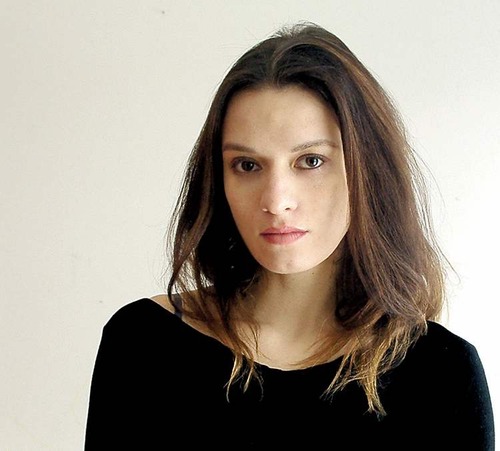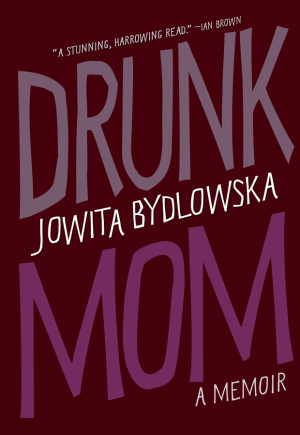
Jowita Bydlowska’s first novel, Drunk Mom, was published this past spring to much controversy in Canada; it’s the fascinating memoir of her own time as an alcoholic mother of a young son, living with her child and her partner in downtown Toronto. She was interviewed by the novelist Susan Swan, over email. The book can be ordered from Canada, or you can wait for Summer 2014, when it will be published in the U.S. by Penguin.
THE BELIEVER: Your memoir, Drunk Mom, was given the biggest coverage of any book that debuted in Canada this past spring. How did you come to write it?
JOWITA BYDLOWSKA: I pitched this as work of fiction to my agent, because I thought it would be an interesting character to write about—a mother who drinks, a sort of an ordinary villain. We usually expect big things from our villains—explosions, large-scale betrayals—but there are many not-so-obvious villains out there, too. Seeing my own story as fiction made the danger less real, perhaps until—what an apt cliché—reality caught up with me.
BLVR: Ah, an ordinary villain. And a female one, too! Women journalists have been snide or punitive in the coverage of your memoir. Why were their reactions so nasty? Any theories?
JB: Cliché #2: In terms of any reaction, positive and negative, I think the reaction says more about the person who reacts than what she reacts too.
BLVR: Were the negative articles hard on your family?
JB: Yes. When the first negative coverage came out, my partner said he’d rather live in the world full of flawed people like me than a world full of people mewing about flawed people. That’s always been our attitude about each other, so it was nice to see that it stood this trial. We’ve had a lot of support from our friends and people, especially writers, we admire.

BLVR: Some journalists said your book would hurt your young son, later on. They didn’t seem to understand that the author of a memoir has an overview of the experience by the time the book is done. How do you feel about this?
JB: First: I was very, very naïve in hoping that the media would respect my efforts to not have my son’s name mentioned (or my partner’s name) in the book coverage. In the book, they are referred to as “Frankie” and “the boyfriend,” and there’s an explanation for why I did that in the acknowledgments. No one read that part. But the book is not about my son or my partner. At the same time, I understand the attraction of gossip. Second: This book is no longer about me! Precisely because the author is not the narrator. Third: Are people trying to say that my son should be ashamed? If yes, why should he be ashamed? As much as the book is about the darkness of addiction and my numerous transgressions connected to it, it’s also a story of me coming out of it. My son is growing up with a sober mom.
BLVR: Your memoir distills and dramatizes like a novel does. Maybe because you told your story so convincingly it was easy for some interviewers to blur the line between narrator and author.
JB: I wonder if by my not asking for sympathy, some people have mistaken that as permission to step over certain boundaries.
BLVR: I was struck by how entertaining your memoir was. Despite the despair of your narrator, the prose sparked with energy and zest. How did you achieve this?
JB: I’m not sure. I wrote myself the same way I’d write a character in fiction. She was a madwoman and she treated the people around her horribly. It’s been noted how nastily I described some of the people I encountered—this was done on purpose, because an addict has no filter. But I suppose it was my current sobriety/clarity that shone through the despair and made it zesty?
BLVR: Your generation’s new autobiographical writing reads like a great-great grandchild of the Romantic Movement. The self is your subject, but in your investigations, there isn’t much that’s heroic about what you’re describing. The self emerges as a dark and disconcerting muddle of conflicting needs and impulses. (And yet it takes great audacity to be so brutally honest. The courage of honesty is always admirable. Heroic even. So there you go.)
JB: My background is in psychology and journalism, so I’m inclined to observe and report. I had three elements that came together: a subject, my ability to listen to her, and my ability to report on her. I don’t think it’s heroic at all to be able to distance yourself from your actions and report on them. But thank you. Drunk Mom was written very consciously to show what addiction is like. In the book, I say that addiction is like chasing and being chased. There are always two or more thoughts occurring simultaneously and all of them seem equally pressing. I’ve only read a few memoirs. I usually don’t like them, because a lot of them—especially addiction memoirs—have a lot of woe-is-me bits in them, which I find too predictable. I’m not big on getting forced to feel sorry for someone.
BLVR: Your memoir tackles addiction from a new, unlikely perspective—that of a young and relatively happy married mother. In the past, sagas of female addiction seem to have mostly belonged to prostitutes, and not many of your reviewers seem to get that your memoir was a portrait of an addict. What does our society fail to understand about addiction?
JB: The biggest misconception is that addiction is a moral failing, that it is a choice. Also, I just read somewhere how women are often referred to as “train wrecks” whereas men tend to be seen as “tortured”—sympathetic figures. I’m not sure if that’s true, but I’ve certainly been referred to as a “train wreck” in the media.
BLVR: Dichotomies play a large role in your memoir. There’s the doting mom who smothers her young son in kisses, then leaves him unattended while she blacks out. Is that what addiction can feel like—a bigger love than one’s maternal love for a child?
JB: There’s a zombie-like element to it, where getting the fix seems to be a stronger urge than any other. But then, bam, you suddenly do the most primary, life-affirming thing, which is become a parent, and that is perhaps stronger than the first urge, or just as strong. Addiction is death, motherhood is life. It’s impossible to give yourself fully to both. I’ve loved my son the most in the world, from the first ultrasound, but it was not enough. Motherhood is not just love. For me, motherhood triumphed eventually.
BLVR: I want to ask you about that unsettling waking-up scene in the Montreal hotel room. She gets up and discovers the plastic wrap on the dental dam has been taken off, although she has no memory of having sex with the men. This is the narrator’s lowest moment. Was that scene hard to write? Amazingly, it come across with a brilliant madcap élan.
JB: I was talking to a friend who’s been sober for ten years whose new boyfriend—not an addict—read my memoir and was shocked by this scene. My friend said, but how is this shocking? The sad reality of women (mostly women) who drink a lot and black out is that this is not such a shocking scene. None of my sober addict friends were that disturbed. This was brought up a few times by interviewers (female interviewers) with this sort of “oh-my” tone. Their tone made me feel reprimanded, but what they seem to have missed is that they are scolding me for something that was most likely a sexual assault.
BLVR: One final question: do you worry about slipping back into addiction?
JB: Always. And I always think I never will. I think this is one dichotomy I actually can handle.




